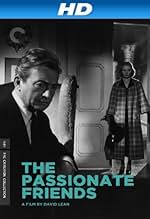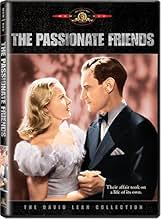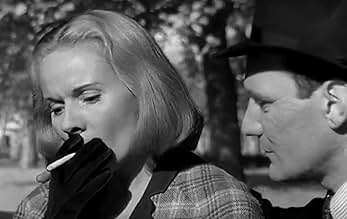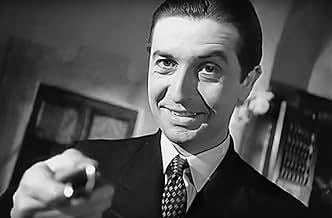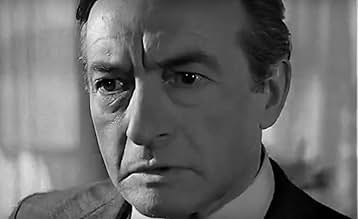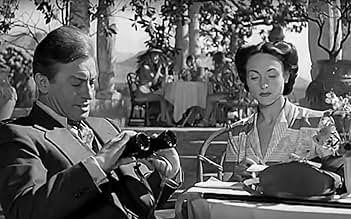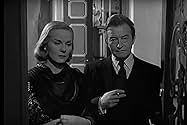IMDb-BEWERTUNG
7,2/10
3402
IHRE BEWERTUNG
Eine Frau trifft einen Mann, dessen Liebe sie vor Jahren abgelehnt hat.Eine Frau trifft einen Mann, dessen Liebe sie vor Jahren abgelehnt hat.Eine Frau trifft einen Mann, dessen Liebe sie vor Jahren abgelehnt hat.
- Auszeichnungen
- 2 Gewinne & 1 Nominierung insgesamt
Hélène Burls
- Flowerwoman
- (Nicht genannt)
Amy Dalby
- Lady on Underground
- (Nicht genannt)
Lisa Daniely
- Cinema Usherette
- (Nicht genannt)
Max Earle
- Third Man - Albert Hall
- (Nicht genannt)
Edward Evans
- Underground Ticket Officer
- (Nicht genannt)
Arthur Howard
- Smith - Butler
- (Nicht genannt)
John Huson
- First Man - Albert Hall
- (Nicht genannt)
Wilfrid Hyde-White
- Lawyer
- (Nicht genannt)
Charles Lloyd Pack
- Man Drinking with Stratton
- (Nicht genannt)
Guido Lorraine
- Hotel Manager
- (Nicht genannt)
Ina Pelly
- Second Woman - Albert Hall
- (Nicht genannt)
Helen Piers
- First Woman - Albert Hall
- (Nicht genannt)
Marcel Poncin
- Hall Porter
- (Nicht genannt)
Empfohlene Bewertungen
The Passionate Friends is the first of three films that director David Lean made with Ann Todd in and she gives a fine performance in this mannered British melodrama that evokes in ways two other popular British films of the era, Lean's Brief Encounter and the Todd starring The Seventh Veil.
Former lovers Mary Justin (Todd) and Steven Stratton (Trevor Howard) meet accidentally at a New year's party and rekindle lost feelings. Trouble is she is married to a wealthy banker Howard Justin (Claude Rains) and Stratton's in a committed relationship. Justin discovers the affair however and puts an end to it. Nine years pass and they meet again while vacationing. Stratton is now married with kids but Howard thinks otherwise and files for divorce. Mary becomes desperate and suicidal.
With quality performances (especially Rains) from all of the leads The Passionate Friends is credible melodrama that overachieves with Lean displaying his superb grasp of film language, employing jump cuts, montage and juxtaposition for maximum effect. With a few Hitchcock like flourishes along the way he does an excellent job of keeping the audience guessing right up until the final minutes. It is this subtle triumph of form that makes The Passionate Friends a superior example of its genre.
Former lovers Mary Justin (Todd) and Steven Stratton (Trevor Howard) meet accidentally at a New year's party and rekindle lost feelings. Trouble is she is married to a wealthy banker Howard Justin (Claude Rains) and Stratton's in a committed relationship. Justin discovers the affair however and puts an end to it. Nine years pass and they meet again while vacationing. Stratton is now married with kids but Howard thinks otherwise and files for divorce. Mary becomes desperate and suicidal.
With quality performances (especially Rains) from all of the leads The Passionate Friends is credible melodrama that overachieves with Lean displaying his superb grasp of film language, employing jump cuts, montage and juxtaposition for maximum effect. With a few Hitchcock like flourishes along the way he does an excellent job of keeping the audience guessing right up until the final minutes. It is this subtle triumph of form that makes The Passionate Friends a superior example of its genre.
This film surprised me a lot. I watched it merely out of curiosity; by the end of the film, I was struck by Ann Todd's performance and had to watch the film twice back-to-back. She expressed her character's inner turmoil so well that I wonder if she was playing herself. I profess I don't watch a lot of movies, barely up to 2,000 films. However, that is only because I am damn picky.
This is rather a mature story of romance. How a relationship could evolve from a marriage of convenience to a real thing of beauty between two people. How one's maturity could evolve from a real thing of passion to a mental state of contentment and stability. It's also a story of irrational jealousy that could potentially negate a prosperous family life.
This is a good example of a film where filmmakers do not have to resort to gratuitous, meretricious scenes to portray lust or passion.
This is rather a mature story of romance. How a relationship could evolve from a marriage of convenience to a real thing of beauty between two people. How one's maturity could evolve from a real thing of passion to a mental state of contentment and stability. It's also a story of irrational jealousy that could potentially negate a prosperous family life.
This is a good example of a film where filmmakers do not have to resort to gratuitous, meretricious scenes to portray lust or passion.
For The Passionate Friends David Lean treads similar ground as he does in his masterpiece, Brief Encounter, although here the source material is an HG Wells story as opposed to a Noel Coward play.
The post-war Lean, with his attention to psychology and emotions, handled these stories of problematic romance brilliantly, and The Passionate Friends is a great example. We open with clouds and snow-capped mountains, a holiday location that foreshadows Lean's Summertime (1955), straight away giving us a sense of dreaminess and soaring emotions.
This is Lean at his most psychological and expressionist. The sound and imagery is always calculated to mirror feelings – like the abruptness of the plane wheel touching the ground when Claude Rains returns from his trip abroad. The acting really supports this too. Considering it's a story about a love triangle, a large amount of the story is told through scenes in which one of the three principal characters is alone, or at least unobserved, and the actors convey inner thoughts through subtle expressions and gestures.
Also, like the bulk of Lean's pictures from this era there are references to the war and the impact it had on British society. It's probably no coincidence that the decision was made to set the flashbacks of the affair in 1939 (Wells' original story was decades older), the year that war broke out. The cold, bureaucratic Claude Rains seems to be in part symbolic of the necessity in wartime to be rational and emotionless, and the story is an allegory for the need to break away from that.
While it is a good story and very well-made, The Passionate Friends is unfortunately no Brief Encounter. On the acting side, Claude Rains is brilliant as always, but I'm less convinced by Ann Todd, who perhaps got the part more because she was Mrs Lean that for her talent. The plot can be a bit confusing with its flashbacks within flashbacks. Probably the biggest problem though is that we never get to totally empathise with the characters. While Brief Encounter's sheer ordinariness made it so universal, you don't get this to the same degree here, and that makes it by far the weaker of the two pictures. Still, it's by no means a disaster, and still one of the better films of David Lean's 1940s output.
The post-war Lean, with his attention to psychology and emotions, handled these stories of problematic romance brilliantly, and The Passionate Friends is a great example. We open with clouds and snow-capped mountains, a holiday location that foreshadows Lean's Summertime (1955), straight away giving us a sense of dreaminess and soaring emotions.
This is Lean at his most psychological and expressionist. The sound and imagery is always calculated to mirror feelings – like the abruptness of the plane wheel touching the ground when Claude Rains returns from his trip abroad. The acting really supports this too. Considering it's a story about a love triangle, a large amount of the story is told through scenes in which one of the three principal characters is alone, or at least unobserved, and the actors convey inner thoughts through subtle expressions and gestures.
Also, like the bulk of Lean's pictures from this era there are references to the war and the impact it had on British society. It's probably no coincidence that the decision was made to set the flashbacks of the affair in 1939 (Wells' original story was decades older), the year that war broke out. The cold, bureaucratic Claude Rains seems to be in part symbolic of the necessity in wartime to be rational and emotionless, and the story is an allegory for the need to break away from that.
While it is a good story and very well-made, The Passionate Friends is unfortunately no Brief Encounter. On the acting side, Claude Rains is brilliant as always, but I'm less convinced by Ann Todd, who perhaps got the part more because she was Mrs Lean that for her talent. The plot can be a bit confusing with its flashbacks within flashbacks. Probably the biggest problem though is that we never get to totally empathise with the characters. While Brief Encounter's sheer ordinariness made it so universal, you don't get this to the same degree here, and that makes it by far the weaker of the two pictures. Still, it's by no means a disaster, and still one of the better films of David Lean's 1940s output.
Every-so-often, a movie has a scene that overshadows the entire movie. This is one of those movies.
There's no need to rehash this movie's storyline -- the reviews do that. The story itself does not stand out among many movies with love triangles.
I'd highly recommend this movie because of Claude Rains' emotional speech toward the end of the movie. It stands out among some of the best acting and the best writing in film. For that scene alone, it is well worth your time. It is one of Claude Rains' best scenes as an actor.
You may have to really search for this movie. For some reason, it is not one that is played often on classic movie channels. Find it and watch it -- you won't be disappointed.
There's no need to rehash this movie's storyline -- the reviews do that. The story itself does not stand out among many movies with love triangles.
I'd highly recommend this movie because of Claude Rains' emotional speech toward the end of the movie. It stands out among some of the best acting and the best writing in film. For that scene alone, it is well worth your time. It is one of Claude Rains' best scenes as an actor.
You may have to really search for this movie. For some reason, it is not one that is played often on classic movie channels. Find it and watch it -- you won't be disappointed.
It's easy to associate "The Passionate Friends" to its detriment with "Brief Encounter"; in its voice-over/flashback structure, in its themes of suicide and adultery, and of course in the casting of Trevor Howard. But in a sense -- although not, unfortunately, an entirely successful one -- in a sense, the later film is an attempt to do something very different with this source material. At the most basic level the two pictures have virtually nothing in common: "Brief Encounter" is a story of renunciation and unselfishness, of ordinary lives in an unromantic setting, of heartbreak from a painfully honest narrator. "The Passionate Friends" (a title never really explained) revolves ultimately around selfishness and self-deception, lavish trappings and a shallow surface gloss epitomised by the cheesy 'Swiss' tourist music that backs the initial establishing shots.
Mary's swelling soft-focus memories of her grand passion are deflated by jarring little jabs from the director, in what I suspect is intended as an alert to the viewer that her romantic-seeming situation is not quite what it seems -- in effect, she is an unreliable narrator, and the pay-off comes when she perceives, finally and appallingly, what she really is and what she has done. It is a climax worth waiting for, but it is slow to arrive; and the subtle wrongness in the love affair, the self-dramatisation and lack of authenticity (whether or not these are deliberate attempts to undermine her presentation of events, as hindsight suggests they may be) until then tend to come across simply as unconvincing story-telling.
It is never clear just what Mary means by her assertion that she wants to belong to herself and not to any lover. By the end, however, it is all too apparent that this mantra, reminiscent of the "Can't tie me down, babe" slogans of the (male) serial shaggers of the Sixties, is every bit as self-indulgent a female pose. She is in love with the idea of being in love: playing at it, day-dreaming transgressions. But when reality strikes, the whole game is exposed as a silly, hugely destructive fantasy.
After the first showdown with her husband (which we are specifically, and with hindsight, significantly, not allowed to witness), she warns Steven that she is not truly a good person to love. We -- and he -- do not then either understand or believe her; but she is right. She is not prepared to give herself, in modern parlance to 'commit': but she will not let go either.
The trouble for me is that for most of its running length the film seems to be simply a somewhat off-kilter account of an adulterous affair, over-ponderous, with clumsy use of music and heavily ironic dialogue. (The cinema audience, young and out for a good time, spent rather more time giggling than I assume the director intended.) The cinematic tricks that are present, such as the abrupt cuts in the taxi scene, the nested flashback structure, or the montage of advertisements in the Tube station reading "Keep Smiling", "Strength" and "Saved", too often seem awkward or labouring the obvious. If the idea was indeed to subtly undermine audience preconceptions, it doesn't really work -- there is no equivalent here to the stunning shift in perception that exists between the opening sequence of "Brief Encounter" and the final unwinding of the flashback.
As the ambiguous Mary, Ann Todd is a strangely elusive presence. The character is at the heart of the plot and has the lion's share of screen time, and yet most of that time it's hard to get a grip on her beyond the superficial. I'm still not sure whether this is an intended result of the acting and/or direction, or a flaw in the film.
Trevor Howard carries off the role of the unfortunate Steven with angular charm and provides the requisite sense of bewildered decency; but as others have rightly remarked, it is Claude Rains, in what might appear a largely peripheral role, who steals the show. Rich, older, physically unprepossessing, and mildly affectionate towards his wife when he can spare a moment from the financial markets, Howard Justin is the face of moneyed security versus the romantic passion promised by Mary's once-and-future lover, and as such represents the trappings of a marriage of convenience rather than an actual human being. But almost from the beginning we are made aware that he is neither unintelligent nor unobservant; later we discover that he is not as complaisant as the other couple have assumed, and finally, that he can be hurt -- and can love -- as deeply as any other man. Over a mere handful of scenes in the course of the film Claude Rains manages to convey more tension and real emotional presence than anyone else, and it is this contribution that makes the final twist both plausible and satisfying.
"The Passionate Friends" is not the great film that I feel it is perhaps trying to be; but it is certainly not an abortive carbon-copy of "Brief Encounter". The resolution of the film is starkly effective and is worth sitting through a glossy and rather uninspired beginning for: as a whole, it can be seen as an honourable failure.
(Edit: for what it's worth, in the month since I saw this film I haven't been able to get it out of my head...)
Mary's swelling soft-focus memories of her grand passion are deflated by jarring little jabs from the director, in what I suspect is intended as an alert to the viewer that her romantic-seeming situation is not quite what it seems -- in effect, she is an unreliable narrator, and the pay-off comes when she perceives, finally and appallingly, what she really is and what she has done. It is a climax worth waiting for, but it is slow to arrive; and the subtle wrongness in the love affair, the self-dramatisation and lack of authenticity (whether or not these are deliberate attempts to undermine her presentation of events, as hindsight suggests they may be) until then tend to come across simply as unconvincing story-telling.
It is never clear just what Mary means by her assertion that she wants to belong to herself and not to any lover. By the end, however, it is all too apparent that this mantra, reminiscent of the "Can't tie me down, babe" slogans of the (male) serial shaggers of the Sixties, is every bit as self-indulgent a female pose. She is in love with the idea of being in love: playing at it, day-dreaming transgressions. But when reality strikes, the whole game is exposed as a silly, hugely destructive fantasy.
After the first showdown with her husband (which we are specifically, and with hindsight, significantly, not allowed to witness), she warns Steven that she is not truly a good person to love. We -- and he -- do not then either understand or believe her; but she is right. She is not prepared to give herself, in modern parlance to 'commit': but she will not let go either.
The trouble for me is that for most of its running length the film seems to be simply a somewhat off-kilter account of an adulterous affair, over-ponderous, with clumsy use of music and heavily ironic dialogue. (The cinema audience, young and out for a good time, spent rather more time giggling than I assume the director intended.) The cinematic tricks that are present, such as the abrupt cuts in the taxi scene, the nested flashback structure, or the montage of advertisements in the Tube station reading "Keep Smiling", "Strength" and "Saved", too often seem awkward or labouring the obvious. If the idea was indeed to subtly undermine audience preconceptions, it doesn't really work -- there is no equivalent here to the stunning shift in perception that exists between the opening sequence of "Brief Encounter" and the final unwinding of the flashback.
As the ambiguous Mary, Ann Todd is a strangely elusive presence. The character is at the heart of the plot and has the lion's share of screen time, and yet most of that time it's hard to get a grip on her beyond the superficial. I'm still not sure whether this is an intended result of the acting and/or direction, or a flaw in the film.
Trevor Howard carries off the role of the unfortunate Steven with angular charm and provides the requisite sense of bewildered decency; but as others have rightly remarked, it is Claude Rains, in what might appear a largely peripheral role, who steals the show. Rich, older, physically unprepossessing, and mildly affectionate towards his wife when he can spare a moment from the financial markets, Howard Justin is the face of moneyed security versus the romantic passion promised by Mary's once-and-future lover, and as such represents the trappings of a marriage of convenience rather than an actual human being. But almost from the beginning we are made aware that he is neither unintelligent nor unobservant; later we discover that he is not as complaisant as the other couple have assumed, and finally, that he can be hurt -- and can love -- as deeply as any other man. Over a mere handful of scenes in the course of the film Claude Rains manages to convey more tension and real emotional presence than anyone else, and it is this contribution that makes the final twist both plausible and satisfying.
"The Passionate Friends" is not the great film that I feel it is perhaps trying to be; but it is certainly not an abortive carbon-copy of "Brief Encounter". The resolution of the film is starkly effective and is worth sitting through a glossy and rather uninspired beginning for: as a whole, it can be seen as an honourable failure.
(Edit: for what it's worth, in the month since I saw this film I haven't been able to get it out of my head...)
Wusstest du schon
- WissenswertesThe second book that Mary Justin and Steven Stratton quote from after dinner ("From the music they love you should know the texture of men's souls.") is roughly taken from English novelist and playwright John Galsworthy's "The Man of Property" (published in 1906), the first in a series of three novels and two interludes comprising the "The Forsyte Saga" (published in 1922). The actual quote is: "By the cigars they smoke, and the composers they love, ye shall know the texture of men's souls."
- PatzerAt 24:00, Howard is using a vacuum coffee maker with a cork seal - although the burner is still on, so the coffee would not have returned to the bottom beaker while the heat was still on.
- Zitate
Mary Justin: I'm not a very good person, Steven. I wanted your love - and I wanted Howard's affection and the security he could give me.
Professor Steven Stratton: I can give you security too, and more than affection.
Mary Justin: You don't really know me at all. My love isn't worth very much.
- VerbindungenFeatured in Discovering Film: Claude Rains (2015)
Top-Auswahl
Melde dich zum Bewerten an und greife auf die Watchlist für personalisierte Empfehlungen zu.
- How long is The Passionate Friends?Powered by Alexa
Details
- Erscheinungsdatum
- Herkunftsland
- Sprachen
- Auch bekannt als
- Apasionada
- Drehorte
- Le Brévent, Chamonix, Haute-Savoie, Frankreich(cable car outing at Brévent in front of Pic du Midi)
- Produktionsfirmen
- Weitere beteiligte Unternehmen bei IMDbPro anzeigen
Box Office
- Weltweiter Bruttoertrag
- 40.335 $
- Laufzeit
- 1 Std. 35 Min.(95 min)
- Farbe
- Seitenverhältnis
- 1.37 : 1
Zu dieser Seite beitragen
Bearbeitung vorschlagen oder fehlenden Inhalt hinzufügen


